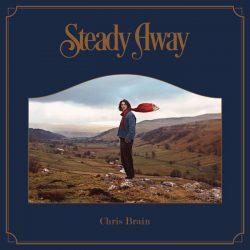A rising star in the English folk scene surpasses expectations with his second album.
 Chris Brain has already established himself on the English folk scene with a very well-received debut album and as a powerhouse behind the recent emergence of the Leeds folk scene, with Brain being credited for having founded and run two folk clubs and a folk festival. His commitment and love for his chosen music is very impressive. Happily, his new album, “Steady Away”, is every bit as impressive.
Chris Brain has already established himself on the English folk scene with a very well-received debut album and as a powerhouse behind the recent emergence of the Leeds folk scene, with Brain being credited for having founded and run two folk clubs and a folk festival. His commitment and love for his chosen music is very impressive. Happily, his new album, “Steady Away”, is every bit as impressive.
Brain describes the new album as having a more inward-looking focus, taking on a more self-reflective quality, but still retaining much of the pastoral and bucolic elements that were so well-received on his first album. It’s hard to avoid comparisons to Nick Drake’s intense, gently-breathy vocals, but Brain’s voice has its own distinctive character. His superb guitar playing has elements of Drake too, but also brings to mind another great folk guitarist, John Martyn. In making the album, Brain credits much-appreciated support from Bert Jansch Foundation and Jansch’s influence is very evident too. However, what’s particularly impressive is how Brain has distilled these influences into his own style of pure folk music. There doesn’t seem to be any attempt to step outside of the genre. It’s unmistakably a folk album. A very fine folk album.
The eleven tracks on the album feature Brain’s warm voice and beautiful guitar work front and centre – with the exception of the track helpfully titled ‘Instrumental’ – but he’s also accompanied on several tracks by Mary-Jane Walker on violin, Alice Phelps on double bass and Simeon Walker on piano and keyboards. Their collective contributions are perfectly measured, always adding to the whole but never diverting attention away from Brain’s central performance.
Opening track, ‘Golden Days’ sets out the stall: warm, simple bass, deftly restrained piano and gentle strings all wrapped delicately around an expertly finger-picked guitar part and soft, wistful vocals. The next track, ‘Please’, opens with a warm strum and an even warmer vocal, with subtle strings underpinning the chord progression before being joined by the piano and bass. Gently understated loveliness.
There’s a distinctly autumnal feel to the album: quiet days, softened colours, fading light. Nothing on the album breaks the spell. Nothing misfires. It all pieces together beautifully. The last two tracks, ‘Weeping Willow’ and ‘Now Westlin Winds’, are stripped back to just voice and guitar, but lose nothing in their intensity, adroitly capturing that end-of-year melancholy.
If gentle, acoustic English folk music is not your thing, then “Steady Away” might not be for you. But if you are open to something new that feels ages-old, is expertly performed and layered with retrained beauty, you really must give this album a listen.


